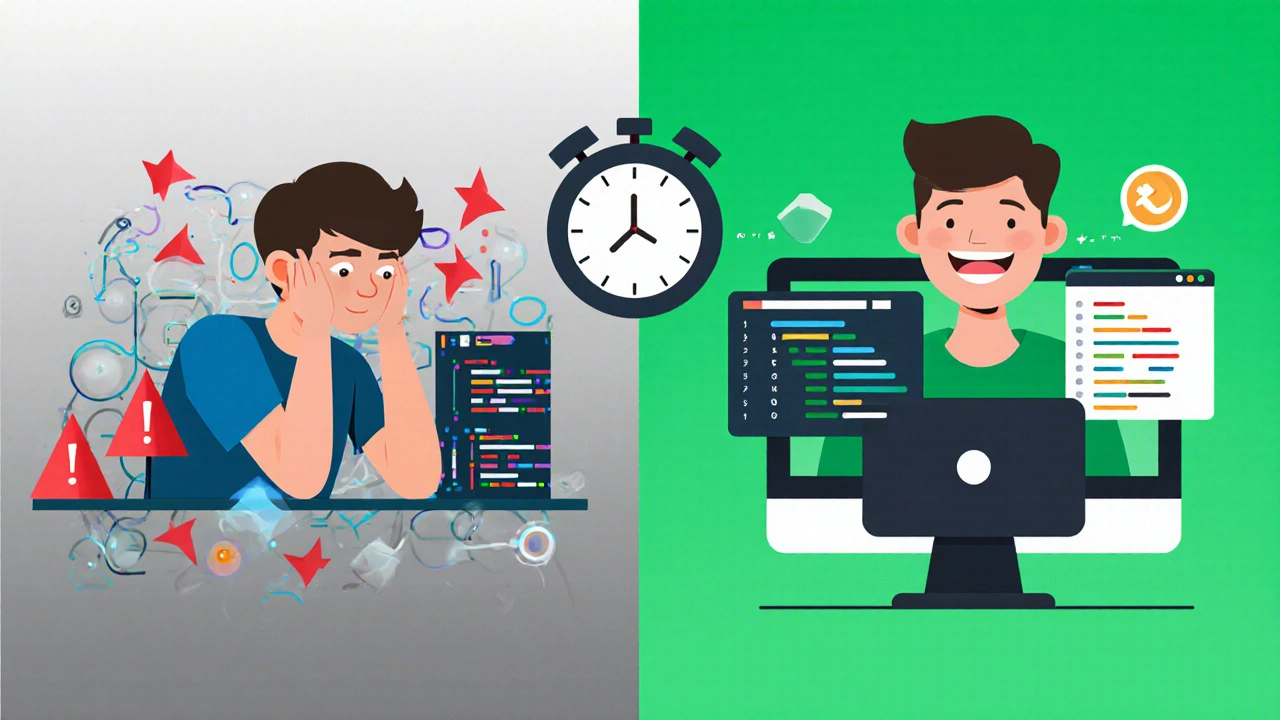Coding Speed Estimator
Calculate your potential time savings by implementing efficiency techniques from the article
Your Estimated Time Savings
If you’ve ever stared at your screen for hours, typing and retyping the same lines of code, you know how frustrating slow coding can be. It’s not about working longer-it’s about working smarter. Becoming a coding pro isn’t about memorizing every syntax rule or mastering ten frameworks. It’s about getting things done faster without sacrificing quality. And yes, it’s possible-even if you’re not a genius or a prodigy.
Stop Typing, Start Thinking
The biggest speed killer in coding isn’t your keyboard. It’s your brain. Too many developers jump straight into writing code before they understand what they’re trying to build. You open your editor, click around, start typing functions, and five minutes later you realize you’re going in the wrong direction.Instead, spend five minutes before you write a single line. Sketch out what the code needs to do. Use paper, a whiteboard, or even a blank document. Break it into tiny pieces: "Get user input," "Validate format," "Save to database," "Return error if failed." When you know the steps, writing the code becomes filling in blanks-not guessing.
One developer I worked with in Melbourne cut his bug-fixing time by 60% just by doing this. He started writing pseudocode before opening his IDE. No more rewriting entire functions because he missed a edge case. He saw it on paper first.
Use Your Editor Like a Pro
Your code editor is more than a fancy notepad. If you’re still using mouse clicks to select lines, copy-paste manually, or scrolling through files to find functions, you’re wasting hours every week.Learn these basics:
- Use keyboard shortcuts for copy, paste, duplicate line, delete line, and jump to definition.
- Enable snippets for common patterns (like loops, conditionals, or API calls).
- Install a code formatter (like Prettier or Black) so you don’t waste time spacing or aligning.
- Use multi-cursor editing to change multiple variables at once.
For example, if you need to rename a variable across ten files, don’t search and replace one by one. Use your editor’s global find-and-replace with regex. In VS Code, press Ctrl+Shift+H (or Cmd+Shift+H on Mac). Done in seconds.
Most developers don’t know 80% of their editor’s features. Spend one afternoon learning just five shortcuts. You’ll save 20+ minutes a day. That’s over 100 hours a year.
Build a Library of Reusable Code
Every time you write something useful-a function that formats dates, a validation script, a helper for API calls-save it. Not in a random folder. Put it in a personal library. Name it clearly. Comment it simply.After six months, you’ll have a toolbox of 50+ ready-to-use pieces. Next time you need to build a login form, you don’t start from scratch. You grab your validateEmail() function, your handleApiError() module, and your formRenderer() component. You’re not coding-you’re assembling.
Some devs call this "code hoarding." I call it being efficient. Companies like Shopify and Airbnb have internal component libraries. You don’t need a team of 200 to do the same. Start small. One function at a time.
Write Less Code
The fastest code is the code you never write. Every line you add is a line that can break, a line that needs testing, a line that someone else has to read later.Before you write a new function, ask: "Can I use something that already exists?"
- Do you need to sort an array? Use
array.sort(), not your own bubble sort. - Need to parse JSON? Use
JSON.parse(), not a regex hack. - Want to handle form data? Use a library like Formik or React Hook Form instead of writing state logic from scratch.
Open-source libraries exist because someone else already solved the problem. And they’ve tested it across thousands of projects. Why reinvent the wheel when you can use one that’s already been polished?
That said-don’t add a library just because it’s popular. If you only need one small feature, write it yourself. But if it’s something complex-authentication, routing, state management-use the tools that work.

Pair Programming Isn’t Just for Beginners
Many think pair programming is for training new hires. It’s not. It’s a speed tool.When you code with someone else, you catch mistakes before they happen. You spot better patterns. You learn shortcuts you didn’t know existed. Even a 20-minute pairing session can save you hours of debugging later.
You don’t need to pair all day. Try it once a week. Pick a tricky bug or a new feature. Sit side-by-side. Talk out loud. Let the other person challenge your approach. You’ll be surprised how often the solution becomes obvious when you explain it.
Remote pair programming works too. Use VS Code Live Share, GitHub Codespaces, or even Zoom with shared screens. The goal isn’t to be watched-it’s to be heard.
Automate the Boring Stuff
If you do something more than twice, automate it.- Running tests? Set up a pre-commit hook with Husky so tests run automatically before you push.
- Deploying? Use GitHub Actions or GitLab CI to auto-deploy when you merge to main.
- Formatting code? Use Prettier + ESLint to fix it on save.
- Generating boilerplate? Use a CLI tool like Yeoman or create your own template with Copilot.
I once worked with a dev who spent 45 minutes every morning setting up his local environment: pulling branches, installing dependencies, restarting servers. He automated it with a single shell script. Now it takes 8 seconds. He got back 5 hours a week. That’s more than half a workday.
Automation isn’t about being fancy. It’s about not repeating yourself.
Know When to Step Away
The myth of the coding marathon is dangerous. Sitting for eight hours straight doesn’t make you faster. It makes you tired, frustrated, and error-prone.Try the Pomodoro Technique: 25 minutes focused coding, 5 minutes break. After four cycles, take 20 minutes off. Walk outside. Stretch. Look at something far away. Your brain resets.
Studies show that developers who take regular breaks write fewer bugs and solve problems faster. One 2024 study from the University of Melbourne found that coders using short, frequent breaks completed tasks 18% faster than those who worked straight through.
Don’t wait until you’re stuck. Step away before you hit the wall. Your best ideas often come when you’re not looking at code.

Measure Your Progress
You can’t improve what you don’t measure. Track your coding speed-not in lines of code, but in tasks completed.Start simple: each day, write down:
- How many features did you finish?
- How many bugs did you fix?
- How many times did you get stuck and need help?
After a month, look back. Did you get faster? Where did you slow down? Did you spend too much time on setup? Did you waste hours on a function that could’ve been a library call?
One developer I know started tracking his daily output. He noticed he spent 30% of his time on git commands. He created a script to automate branching and merging. His daily output jumped by 40%.
Speed isn’t about typing faster. It’s about removing friction.
What Holds Most Coders Back?
Most people think they’re slow because they’re not smart enough. That’s not true. The real blockers are:- Not planning before coding
- Not using shortcuts
- Writing code that already exists
- Not automating repetitive tasks
- Working too long without breaks
Fix these five things, and you’ll become one of the fastest coders in your team-even if you’re not the most experienced.
Speed comes from clarity, not effort. From structure, not hustle. From knowing what to skip, not what to write.
How long does it take to become faster at coding?
You’ll notice improvements within a week if you start using keyboard shortcuts and writing pseudocode before coding. Within a month, you’ll be 30-50% faster if you automate repetitive tasks and reuse code. Becoming truly fast-like finishing a complex feature in half the time-takes consistent practice over 3-6 months. It’s not about talent. It’s about habits.
Does typing speed matter?
Not as much as you think. The average professional coder types 40-70 words per minute. That’s slower than most people think. What matters is thinking speed: how quickly you understand the problem, break it down, and pick the right tool. A coder who types 80 WPM but writes bad code will take longer than someone who types 50 WPM but writes clean, reusable code the first time.
Should I learn more programming languages to code faster?
No. Learning more languages won’t make you faster unless you’re switching contexts often. Instead, master one language deeply-learn its libraries, tools, and patterns. Knowing Python inside out is better than knowing five languages at a surface level. Depth beats breadth when it comes to speed.
Is using AI tools like GitHub Copilot cheating?
No. Copilot, ChatGPT, and similar tools are like calculators for coders. You don’t feel guilty using a calculator for math, right? These tools help you generate boilerplate, suggest fixes, and explain errors. But you still need to understand the code. Use them to save time on repetitive parts, not to avoid learning. The best coders use AI as a co-pilot, not a driver.
What’s the #1 mistake slow coders make?
They don’t plan. They start typing before they know what they’re building. That leads to wasted time, rewrites, and confusion. The fastest coders spend 10-15% of their time thinking and sketching-then 85% executing. You don’t need to be fast at typing. You need to be fast at deciding.
Next Steps: Your 7-Day Coding Speed Challenge
Want to get faster starting tomorrow? Try this:- Day 1: Learn 3 keyboard shortcuts in your editor.
- Day 2: Write pseudocode before coding any new task.
- Day 3: Find one function you wrote twice and turn it into a reusable module.
- Day 4: Set up one automation (test runner, formatter, or deploy script).
- Day 5: Pair with someone for 20 minutes on a small task.
- Day 6: Take a 5-minute break every 25 minutes.
- Day 7: Track your progress. How many tasks did you finish vs. last week?
Don’t aim for perfection. Aim for progress. One small habit change can turn you from a slow coder into a fast one-not because you’re smarter, but because you’re working smarter.

